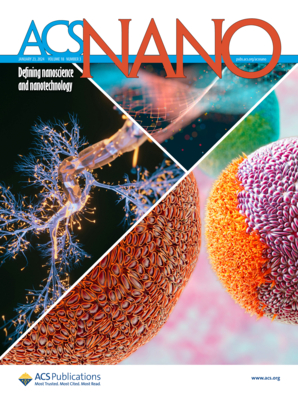Overcoming Strength-Toughness Trade-off of Furandicarboxylic Acid-Based Polyester via Nanoconfined Crystallization.
IF 15.8
1区 材料科学
Q1 CHEMISTRY, MULTIDISCIPLINARY
引用次数: 0
Abstract
2,5-Furandicarboxylic acid (FDCA)-based polyesters are among the most promising materials for achieving sustainability and recyclability of plastics in the current era of the energy crisis. However, it is difficult to construct one single polyester with integrated high strength, toughness, and gas barrier properties. Inspired by the biomineralization process of nacre, herein we develop a nanoconfined crystallization strategy to manufacture innovative FDCA-based pseudo-mineralization polyester (denoted as PMP) that combines ultrahigh mechanical strength, toughness, and excellent barrier properties. Specifically, large-aspect-ratio boron nitride nanosheets (BNNSs) are used as a lamellar template to induce in situ growth and nanoconfined crystallization of polybutylene furandicarboxylate (PBF), leading to the delicate biomimetic multilayer structure that constricts PBF nanocrystals within the highly oriented BNNS layers. Such a rational material design establishes an ideal structural strengthening mechanism via the "in situ orientation-nanoconfined crystallization-multiple energy dissipation". As a result, ultrahigh mechanical strength (≈92 MPa) and toughness (≈105 MJ/m3) are achieved in one FDCA-based material system. Additionally, high gas barrier properties (e.g., O2 5×) are demonstrated owing to the high crystallinity and lamellar structure that hinder the infiltration of gas molecules. This work endows FDCA-based polyesters with integrated performance benefits and provides good possibilities for constructing high-performance biobased materials.利用纳米晶化技术克服呋喃二甲酸基聚酯的强度-韧性平衡。
2,5-呋喃二羧酸(FDCA)基聚酯是在当前能源危机时代实现塑料可持续性和可回收性最有前途的材料之一。然而,很难构建一种具有综合高强度,韧性和气体阻隔性能的单一聚酯。受珍珠质生物矿化过程的启发,我们开发了一种纳米限制结晶策略来制造创新的基于fdca的伪矿化聚酯(简称PMP),该聚酯结合了超高的机械强度、韧性和优异的阻隔性能。具体来说,利用大宽高比氮化硼纳米片(BNNSs)作为片层模板,诱导聚呋喃二羧酸丁烯(PBF)的原位生长和纳米约束结晶,形成精细的仿生多层结构,将PBF纳米晶体压缩在高度定向的BNNS层内。这种合理的材料设计通过“原位取向-纳米约束结晶-多重能量耗散”建立了理想的结构强化机制。因此,在一个fdca基材料体系中实现了超高的机械强度(≈92 MPa)和韧性(≈105 MJ/m3)。此外,由于高结晶度和阻碍气体分子渗透的层状结构,证明了高气体阻隔性能(例如O2 5x)。这项工作使fdca基聚酯具有综合性能优势,并为构建高性能生物基材料提供了良好的可能性。
本文章由计算机程序翻译,如有差异,请以英文原文为准。
求助全文
约1分钟内获得全文
求助全文
来源期刊

ACS Nano
工程技术-材料科学:综合
CiteScore
26.00
自引率
4.10%
发文量
1627
审稿时长
1.7 months
期刊介绍:
ACS Nano, published monthly, serves as an international forum for comprehensive articles on nanoscience and nanotechnology research at the intersections of chemistry, biology, materials science, physics, and engineering. The journal fosters communication among scientists in these communities, facilitating collaboration, new research opportunities, and advancements through discoveries. ACS Nano covers synthesis, assembly, characterization, theory, and simulation of nanostructures, nanobiotechnology, nanofabrication, methods and tools for nanoscience and nanotechnology, and self- and directed-assembly. Alongside original research articles, it offers thorough reviews, perspectives on cutting-edge research, and discussions envisioning the future of nanoscience and nanotechnology.
 求助内容:
求助内容: 应助结果提醒方式:
应助结果提醒方式:


